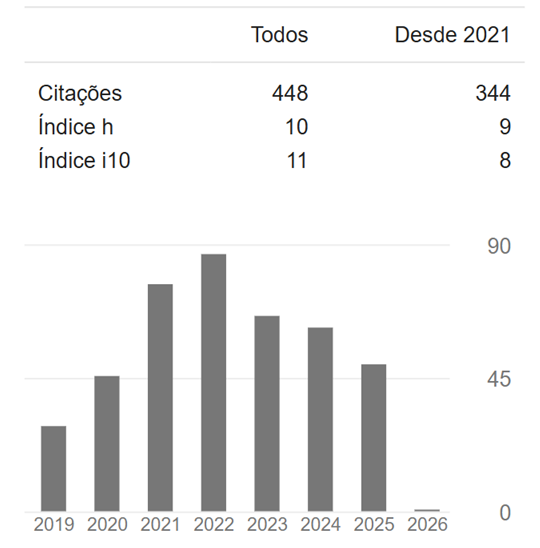Sense of humor and approaches to learning in university students
Palavras-chave:
Academic achievement, Approaches to learning, HumorResumo
This study aimed to analyze the relations between university students’ approaches to learning and self-referential sense of humor. It also investigated how both approaches and self-referential humor relate with academic achievement. The sample involved 224 university students, that frequented from the 1st to the 3rd academic year of their graduation. Self-referential sense of humor was evaluated through the Humor scale of an adapted version of the Self-Perception Profile for College Students – SPPCS of Neeman and Harter (1986), according to Barros (2012), and approaches to learning trough the 2nd version of the Inventory of Learning Processes for University Students (IPA-u), according to Duarte (2007). Data were subjected to Pearson correlations to study connections between variables. Results revealed negative significant correlations between Self-referential sense of humor and both Surface Learning Strategy (i.e., rote learning) and Surface-Achieving Approach to Learning (i.e., learning motivated by extrinsic pressures, competitions and high grades; rote learning). Besides, a significant positive correlation was found between Self-referential sense of humor and Organizing Strategy 2 – Management (i.e., personal management) and between Deep Approach to Learning (i.e., positive emotions in learning; learning by comprehending, inter-relating information and using critical thinking) and academic achievement.
Downloads
Referências
ABOUSERIE, R. Self-esteem and achievement motivation as determinants of students’ approaches to studying. Studies in Higher Education, v. 20, p. 19-26, 1995.
BANAS, J. A., DUNBAR, N., RODRIGUEZ, D., & LIU, S. A review of humor in education settings: Four decades of research. Communication Education, v. 60, n. 1, p. 115-144, 2011.
BARROS, A. Características psicométricas da adaptação portuguesa do perfil de auto-percepção para estudantes universitários – SPPCS. Revista Ibero-Americana de Evaluación y Diagnóstico Psicológico, v. 33, n. 1, p. 93-110, 2012.
BERLYNE, D. E. Humor and its kin. In: GOLDSTEIN, J. H.; MCGHEE, P. E. (Eds.). The psychology of humor: Theoretical perspectives and empirical issues. New York: Academic Press, 1972. p. 43–60
BIGGS, J. B. Teaching for quality learning at university. Buckingham: Open University Press, 1999.
CANO, F. Epistemological beliefs and approaches to learning: Their change through secondary school and their influence on academic performance. British Journal of Educational Psychology, v. 75, p. 203-221, 2005.
DISETH, Å. Approaches to learning, course experience and examination grade among undergraduate psychology students: Testing of mediator effects and construct validity. Studies in Higher Education, v. 32, p. 373-388. 2007.
DISETH, A. Personality as an indirect predictor of academic achievement via student course experience and approach to learning. Social Behavior and Personality, v. 41, n. 8, p. 1297-1308. 2013.
DISETH, Å.; KOBBELTVEDT, T. A mediation analysis of achievement motives, goals, learning strategies, and academic achievement. British Journal of Educational Psychology, v. 80, p. 671-687, 2010.
DUARTE, A. M. Conceptions of learning and approaches to learning in Portuguese students. Higher Education, v. 54, p. 781-794. 2007.
ENTWISTLE, N.; TAIT, H.; MCCUNE, V. Patterns of response to approaches to studying inventory across contrasting groups and contexts. European Journal of Psychology of Education, v. 15, p. 33-48, 2000.
GEISLER-BRENSTEIN; SCHMECK, R. R.; HETHERINGTON, J. An individual difference perspective on student diversity. Higher Education, v. 31, p. 73-96. 1996.
HACKATHORN, J.; GARCZYNSKI, A. M.; BLANKMEYER, K.; TENNIAL, R. D.; SOLOMON, E. D. All kidding aside: Humor increases learning at knowledge and comprehension levels. Journal of the Scholarship of Teaching and Learning, v. 11, n. 4, p. 116 – 123. 2011.
HORSTMANSHOF L.; ZIMITAT, C. Future time orientation predicts academic engagement among first-year university students. British Journal of Educational Psychology, v. 77, p. 703–718. 2007.
ISEN, A. M.; DAUBMAN, K. A.; NOWICKI, G. P. Positive affect facilitates creative problem solving. Journal of Personality and Social Psychology, v. 52, n. 6, p. 1122-1131, 1987.
MARTIN, R. A. The psychology of humor: An integrative approach. Burlington: Elsevier, 2007.
NEEMAN, J.; HARTER, S. Manual for the self-perception profile for college students. University of Denver. 1986. [Unpublished Manuscript]
OPPLIGER, P. A. Humor and learning. In: Bryant, J.; Roskos-Ewoldsen, D.; Cantor, J. R. (Eds.). Communication and emotion: Essays in honor of Dolf Zillmann Mahwah, NJ: Lawrence Erlbaum Associates, 2003. p. 255–273.
ROMÁN, S.; CUESTAS, P. J.; FENOLLAR, P. An examination of the interrelationships between self‐esteem, others' expectations, family support, learning approaches and academic achievement. Studies in Higher Education, v. 33, n. 2, p. 127–138. 2008
RUCH, W. Assessment of appreciation of humor: Studies with the 3 WD Humor Test. In: Spielberger, C. D.; Butcher, J. N. (Eds.). Advances in personality Assessment, v. 9. Hillsdale, NJ: Lawrence Erlbaum Associates, 1992, p. p. 27–75.
STAMBOR, Z. How laughing leads to learning. Monitor on Psychology, v. 37, n. 6, p. 62, 2006.
WATKINS, D. Correlates of approaches to learning: A cross-cultural meta-analysis. In: Sternberg, R. J.; Zhang, L. F (Eds.). Perspectives on thinking, learning, and cognitive styles. Mahwah, N. J.: Lawrence Erlbaum, 2001, p. 165-195.
Downloads
Publicado
Métricas
Visualizações do artigo: 104 PDF downloads: 35
Como Citar
Edição
Seção
Licença
Copyright (c) 2017 Revista Tecnia

Este trabalho está licenciado sob uma licença Creative Commons Attribution 4.0 International License.
Autores e autoras que publicam na Tecnia concordam com os seguintes termos:
1) Autores e autoras mantêm os direitos autorais e concedem à revista o direito de primeira publicação, com o trabalho simultaneamente licenciado sob a Licença Creative Commons Attribution, que permite o compartilhamento do trabalho com reconhecimento da autoria e publicação inicial nesta revista.
2) Autores e autoras têm autorização para assumir contratos adicionais separadamente, para distribuição não exclusiva da versão do trabalho publicada nesta revista (ex.: publicar em repositório institucional ou como capítulo de livro), com reconhecimento de autoria e publicação inicial nesta revista.
3) Autores e autoras têm permissão e são estimulados a publicar e distribuir seu trabalho online (ex.: em repositórios institucionais ou na sua página pessoal) após a finalização do processo editorial, já que isso pode aumentar o impacto e a citação do trabalho publicado (Veja O Efeito do Acesso Livre).








